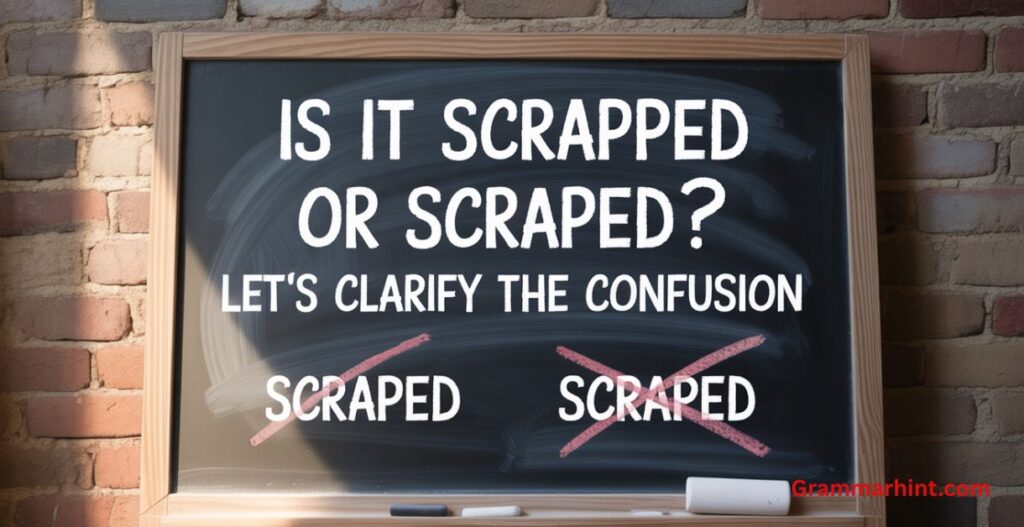Language can trip us up with words that look alike but mean very different things. The pair scraped vs scrapped is a classic example.
Whether you’re writing an email, a report, or just texting a friend, mixing them up can muddy meaning or even change the tone of your message. Below, we unpack this word confusion, dive into their grammar, etymology, usage, and give you heaps of tips to master this linguistic nuance.
Linguistic Clarification (Scrapped vs Scraped)
First, let’s sort the basics:
| Word | Function | Meaning |
|---|---|---|
| scrape | Verb (past: scraped) | To remove material from a surface; to get by barely. |
| scrap | Verb (past: scrapped) | To abandon or discard a plan or item. |
- scraped is past tense of scrape.
- scrapped is past tense of scrap.
It’s that simple—on paper. But in real writing, the difference matters:
- If you remove paint, you scrape it.
- If you cancel a project, you scrap it.
Now, let’s dig deeper.
Grammar and Usage
1. Past Tense Usage
Both “scrape” and “scrap” are verbs. Their past tense forms—scraped and scrapped—fit into this format:
- Sarah scraped the cheese off the lasagna before serving.
- The team scrapped the entire proposal yesterday.
Often, writers mistakenly write “scrapt” or “scrap’d,” but the correct form is scrapped with a double “p”—once for pronunciation and once for consistency with other verbs (like dropped).
2. Physical vs Conceptual Actions
- Physical abrasion: “I scraped the ice off the windshield before driving to work.”
This is literal surface cleaning—scraping off one layer to reveal another. - Conceptual abandonment: “The project was scrapped due to high costs.”
That’s cancellation, not cleanup. This is purely figurative.
Figuring out scraping vs scrapping
Ask yourself:
- Are you talking about scraping—physically removing something?
- Or is it about scrapping—cancelling or discarding mentally or figuratively?
This helps avoid mixing them up every time.
Etymology of Verbs (Old Norse, Old English)
- Scrape comes from Old Norse skrapa, meaning “to scratch.”
- Scrap comes from Old English scræppe, meaning “a piece broken off,” later evolving into the verb “to discard.”
So even historically, one dealt with abrasion and the other wi
Figurative Use
- “He scraped through the exam” means he barely passed—not that he actually scraped the paper.
- “They scraped the ice off the frozen pond to test its thickness.”—literal abrasion.
These differences matter in tone and meaning.
Contextual Usage in English Writing

Email example: scrapped
Subject: Project Update: Q3 Roadshow
Hi Dave,
Due to rising costs, the project was scrapped yesterday. We’ll revisit the proposal in six months, but for now, it’s off the table.
Best,
Pat
Notice the clear use of scrapped to show cancellation, not cleanup.
Email example: scraped
Subject: Windshield Fixed
Hi Sarah,
I scraped most of the frost off the windshield this morning and made it to work early. If you need help, I can check yours too.
Cheers,
Mike
This shows literal, physical action. The meaning stays clear.
Word Confusion / Common Mistakes in English
Here’s a classic mishap:
“We scraped the project due to low interest.”
That sounds odd, as if someone physically removed the project from existence. The right verb here is scrapped. Use the table below to catch errors:
| Incorrect | Correction | Meaning |
|---|---|---|
| We scraped the project | We scrapped the project | We canceled it centrally. |
| She scrapped the ice from the car | She scraped the ice from the car | She removed frost literally. |
Difference Between Cancellation and Physical Action

Scrapped = cancellation.
- “The ride was scrapped due to weather.”
- Synonyms: cancelled, abandoned.
Scraped = physical cleaning or minimal success.
- “She scraped gum off the chair.”
- “He scraped through algebra.”
Minimal Achievement / Barely Passing
Another angle: scraped through meaning = minimal effort. You didn’t ace it; you survived.
Example:
- “Tom scraped through the exam, even though he didn’t study.”
This ties into common phrases like “scraping by in life or exams.”
Scratch vs Scrap
- Scratch = a small cut or mark.
- Scrap = a leftover bit or to discard.
Don’t mix scratching the car with scrapping the car—one’s a dent, the other’s the decision to get rid of it.
English Vocabulary Enrichment
- Use “scrapped” when talking about obsolete product lines:
- “Our company scrapped the flip phone model in 2018.”
- Use “scraped” when dealing with physical removal:
- “We scraped the rust off the railing before painting.”
Communication Accuracy
Precision keeps you credible:
- Want to show you canceled a plan? Use scrapped.
- Want to describe cleaning or sanding? Use scraped.
- Writing “scraped vs scrapped” posts? Here’s the clear distinction.
Etymology Refresher
Old Norse and Old English roots remind us:
- Scrape → skrapa → scratch, remove
- Scrap → scræppe → broken piece, then eliminated
Understanding origins helps with the deeper linguistic nuance.
Past Tense Forms in Action
- He scraped the paint yesterday.
- They scrapped the plan last week.
In both cases, past tense tells the timing. You’ll often see phrase combos like:
- “Past tense usage: she scraped through her exams.”
Usage Difference: Physical Versus Conceptual Actions
- Cleaning: “I scraped the burnt cheese off the bottom of the pan.”
- Decision-making: “Our team scrapped its quarterly goals after the budget review.”
Verb Synonyms Table
| Action | Verb | Synonym |
|---|---|---|
| Physical cleaning | scraped | removed, shaved, pared |
| Cancellation/discarding | scrapped | abandoned, cancelled, shelved |
Word Mix-Up Examples
Misunderstanding in word choice
“When we scraped the plan…”
It should be scrapped. Scraped means abrasion, not cancellation.
When to Use Scrapped
Use it for:
- Project cancellation:
“The project was scrapped due to high costs.” - Discarding items:
“They scrapped the old prototype after testing.”
When to Use Scraped
Use it for:
- Surface removal:
“I scraped off the dried paint.” - Minimal success:
“She scraped through the interview.”
Figurative and Literal Meanings
- Literal: “He scraped mud off his boots.”
- Figurative: “She scraped through despite challenges.”
English Writing Accuracy Tips
- Check whether your context is about cancellation or physical/effort action.
- If it’s cancellation, scrapped.
- If it’s removal or minimal pass, scraped.
- Always double-check the past tense usage.
- Use synonyms like discard vs remove depending on nuance.
- Think about contextual usage. Are you acting on an object or an idea?
More Everyday Examples
Email 1: Team Update
Subject: Design Phase Cancelled
Hi Leon,
We’ve agreed to scrap Option B—we’re sticking with our original concept. Let me know if you’d like to review the specs for Option A.
Thanks,
Arya
Email 2: House Chores
Subject: Morning Chore Check?
Hi Tim,
Don’t forget to scrape the snow off the driveway before the sun hits. I cleared it yesterday after breakfast.
Cheers,
Ellen
Scraping vs Scrapping in Longer Context
- scraping vs scrapping are easy to confuse in casual writing.
- scraping = cleaning, minimal achievement.
- scrapping = giving up or cancellation.
Consider this sentence:
“We spent the afternoon scraping together figures for the scrapping of Project Z.”
Now that’s a tongue-twister. It means you were physically working on numbers related to the cancellation of Project Z.
Word Origins (Old Norse, Old English)
We touched on roots already. Here’s a bit more:
- Scrape: akin to German schaben (to shave)
- Scrap: linked to Old High German scrappa (a fragment)
These roots highlight how literal abrasion and discarding fragments come from different histories—though they now sound alike.
Figurative Use & English Vocabulary Enrichment
Our language is rich. By picking the right form you show sophistication:
- “She scraped together enough money to rent the apartment.” (barely made it)
- “They scrapped the idea of remote working.”
If you mix them up, you lose credibility.
Communication Accuracy & Language Precision
Writers aiming for precision need to remember:
- grammar clarification on past tense.
- That “word confusion/common mistakes in English” stagnates clear communication.
- This pair is small but mighty in effect.
Final Takeaways: Scrapped or Scraped?
- If it’s about canceling or abandoning, it’s scrapped.
- If it’s about removing, sanding, or barely passing, it’s scraped.
- Remember: scrap vs scrape—the ending makes all the difference.
English Writing Tips in Summary
- When to use scrapped ✅ Cancelling, discarding ideas or items
- When to use scraped ✅ Physical removal or minimal achievement
- Common synonyms: discard vs remove, ax vs shave off
- Double-check past tense forms
- Etymology insight: helps cement difference in your mind
- Minimal pass idiom: scraped through = barely made it
Word Confusion: Visual Aid Comparison
| Concept | Word | Example |
|---|---|---|
| Cancellation | scrapped | “The project was scrapped due to high costs.” |
| Physical removal | scraped | “I scraped the ice off the windshield.” |
| Minimal success | scraped | “He scraped through the exam.” |
| Verb origins | — | Old Norse vs Old English roots |
In Real Life: More Scenarios
- You scraped the frosting off the cake for someone allergic to sugar.
- You scrapped the entire trip because of budget cuts.
- You scraped through the final race and qualified for the finals.
- You realized writing “the project was scraped due to costs” will get a snicker—you meant scrapped.
Figurative Brushstrokes
Like a painter who scrapes away paint to reveal color beneath, know when to scrap an idea that doesn’t work.
Improve English Communication: Final Tips
- Read your sentence and ask: “Is this physical removal or figurative cancellation?”
- Practice using each in context. Write emails like we’ve shown above.
- When proofreading, specifically check “scrapped or scraped.”
- Build awareness of homophones and heterographs (words that sound alike but are spelled differently)—this is a classic case.
How to Avoid Misunderstanding in Word Choice
- Use grammar-check tools to flag mismatches.
- Read aloud. If “scraped” sounds off, that’s a signal.
- Share drafts with peers. Ask “Did I mean scrape or scrap here?”
Enrich Your Vocabulary
- Don’t just know scrap vs scrape—know scratching, shaving, canceling, shelving, jettisoning.
- Add variety: ax, ditch, wipe, pare.
Final Thoughts
Mastering scraped vs scrapped sharpens your writing. It’s not just about avoiding embarrassment it’s about language precision and communication accuracy. Whether you’re brushing off frost, barely passing a tough exam, or canceling a big project, you now have the tools to pick the right word. Scraped. Scrapped. Know when and why each one matters.









